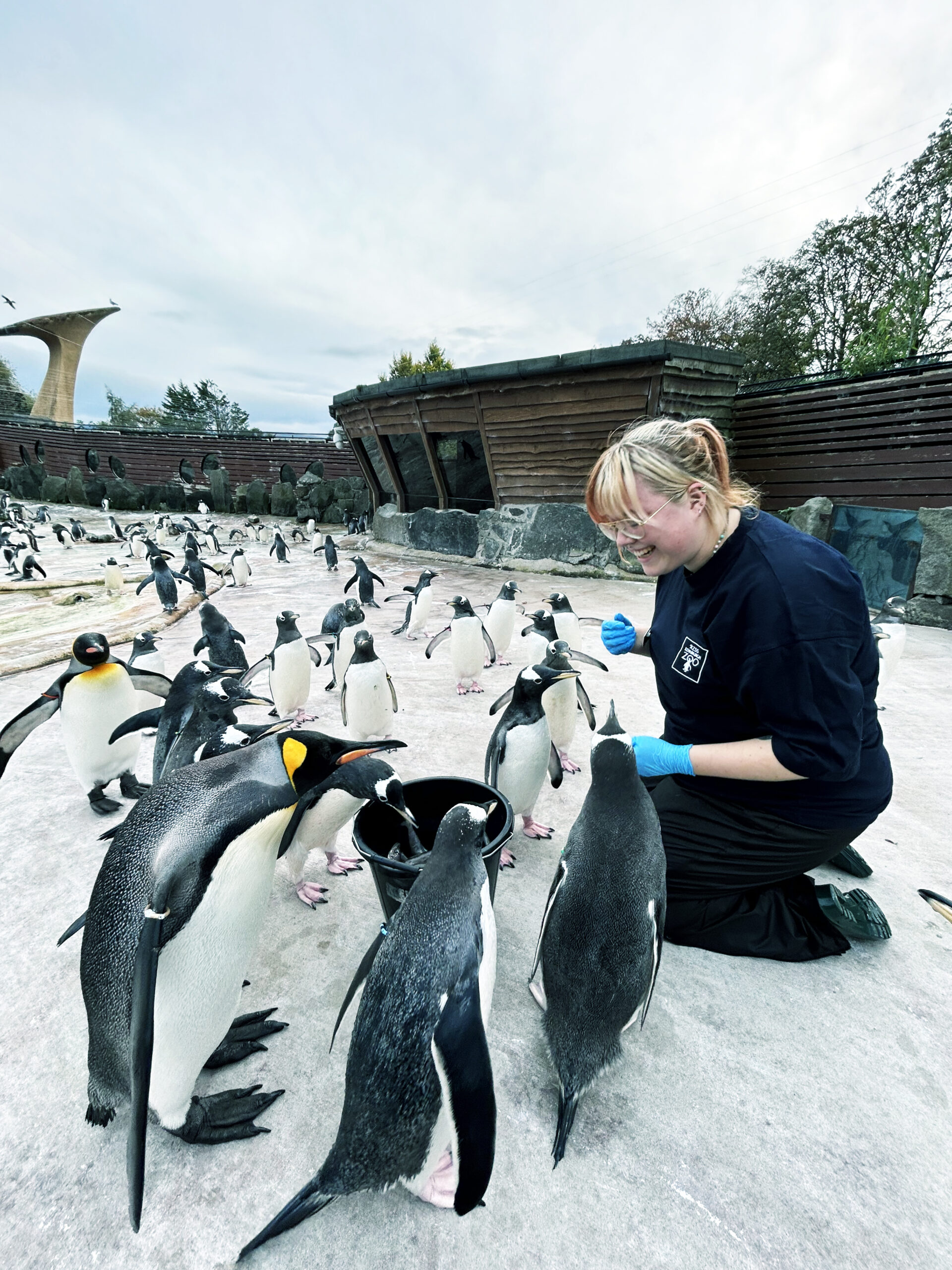 Erin Flattley is the new Earth Fellow for the College.
Erin Flattley is the new Earth Fellow for the College.
These fellowships have been established by the University’s Earth Initiative, giving students the chance to work on projects related to climate, environment, and sustainability. Erin is currently studying an MSc in Biodiversity, Wildlife and Ecosystem health.
Tell us a little about your background.
I’m originally from Brotton, which is a small village close to Middlesbrough on the northeast coast of England. I’ve always had an interest in animals and spent a lot of time growing up around horses – working both in livery and with the Riding for the Disabled Association, then later volunteering at local vets and working with camelids at an alpaca farm.
I attended Bangor University to study Zoology with Animal Behaviour, where in my final year I did my dissertation focussing on how climate change affects behaviour plasticity in primate species.
I graduated with a first in 2022, then moved up to Edinburgh with a view to completing my masters in Biodiversity, Wildlife, and Ecosystem Health. I’m currently in the second year of a three-year programme. The added flexibility of the study programme has allowed me time to work as an animal keeper at RZSS Edinburgh Zoo, working with a range of species – most recently, sun bears, binturongs, otters and Scottish wildcats.
Why did you apply for the Earth Fellow scheme?
I found out about the role through a Learn discussion post. After looking into the Edinburgh Earth Initiative (EEI), I found that the work they were doing was incredibly interesting to me and it was an institution I wanted to be a part of.
I’ve spent many years of my life studying the effects of climate change on wildlife and their environment, but it can feel quite helpless reading about the damage it’s doing but not about what affects climate change itself. The subjects I studied were/and are quite entrenched in the subjects of climate change, sustainability and nature but I know from my friends working in other fields that in other disciplines, there’s little to no teaching about it and as a university pushing for net zero by 2040, the subject can be quite confusing if you aren’t already learning about it.
I’m really looking forward to continuing my research over the next year.
How will the fellowship work? What do you hope to achieve?
My role as an Earth Fellow is on the curriculum transformation project. We’re looking at our school’s undergraduate courses and mapping how they have already integrated the subjects of climate change, nature, and sustainability, and how best the level of integration can be improved.
As a biomedical student, I’m analysing Edinburgh Medical School and its curriculum across undergrad courses. I’m looking at how these courses include the United Nations sustainable development goals, and planetary health goals. The project is looking at the development of different curriculum archetypes, so my work will go towards looking at which of these is the best for courses in the medical school so that they are appropriate given how over-full the curriculum already is.
I’m currently working on some surveys to better include staff and students in the process of curriculum transformation, to get a better idea of how they feel about the level of teaching about the aforementioned subjects and the further integration of the subjects into their courses. So, people should be keeping an eye out for these coming to their inboxes in the coming months!
As the curriculum transformation project continues, even after my fellowship ends, having provided some of the groundwork for it will be an incredible achievement for me as I’ve never really been a part of this sort of project before.
How do you feel your MSc programme has helped you/will help you to make an impact through your fellowship position?
The structure of my MSc – its assignments especially – have really helped with my understanding of things like proposal documents and grant proposals, which in turn have helped with my professional communication skills.
I think this will also help a lot with further communication with staff and students within the EEI, the Medical School and further afield, especially when it comes to presenting my findings throughout my fellowship.
What are the key challenges emerging at the interface between climate change, biodiversity loss and health?
One of the main issues that’s becoming increasingly more challenging is the spread of infectious diseases, especially zoonotic diseases. Increasing temperatures and humidity brought about by climate change brings about more favourable conditions for pathogens. This facilitates the spread of diseases, especially in poorer countries. This, combined with fluctuations in food security caused by the same conditions, cause the biggest strain on not only human health, but global and planetary health.
We are in a position to help this, though. Part of the United Nations 17 Sustainable Goals are to prevent hunger, provide clean water and sanitation and good health and wellbeing for all people. These goals have led to progress in many areas providing better living conditions for many people.
We’re all aware of the massive threat that climate change presents to humanity. It’s easy to feel powerless and hopeless. Are there reasons to be optimistic?
I definitely agree that it can be very overwhelming to think about climate change. But I think there’s reasons to be optimistic about it. There is constant work being done into research and development of climate sciences – the use of renewable energy is at an all time high with places like Portugal setting new records for producing surplus renewable energy. Renewable energy is increasingly cheaper and more accessible and the use of this will make a huge difference.
I think even keeping up with stories such as the Sumatran rhino calf being born in Indonesia, helping with the near-endangered numbers of the species are important for keeping up morale.
While it’s easy to have anxiety about the subject, we need to be optimistic. We are more educated than ever on what needs to be done to help reduce the effects of climate change and “the people” have more and more say in what’s needed to help with development of policy etc.
Even events such as COP are becoming more accessible with COP28 being one of the largest gatherings of its kind, where even the University of Edinburgh has a number of representatives – with online delegates being present at many events.
What should our college do to maximise our impact on said challenges? How should we evolve our operations and research?
I think the reputation of the university speaks for itself: we’re world renowned for our research and I think that’s key to making an impact. Looking at the United Nations sustainability development goals with regard to research is really important I think, especially with scientific developments in global health.
As a university, the focus on sustainability is definitely moving in the right direction- with things like the recent climate strategy consultation being open to all students. It will be interesting to see the feedback of those meetings.
In terms of teaching, I think this project is going to be really important. Without knowing the gaps that need filling, it seems like an impossible task to achieve but with the work my and other fellows are doing it will allow the course leaders and other higher up staff to look at how we can maximise our impact.
How can our student and staff community become more involved and active in addressing our sustainability challenges?
In terms of what individuals can do to make a difference, general things like trying to reduce personal carbon emissions and being more conscious about waste production and where it is going is a good place to start.
If people have ideas for sustainable projects, applying for the Sustainable Campus Fund to help reduce the university’s impact on the environment can also make a difference.
For academics reading, if you feel you are already addressing sustainability needs or helping integrate climate change into your teaching practice; or have ideas that could help further the curriculum transformation project within the school of medicine – please get in touch!


